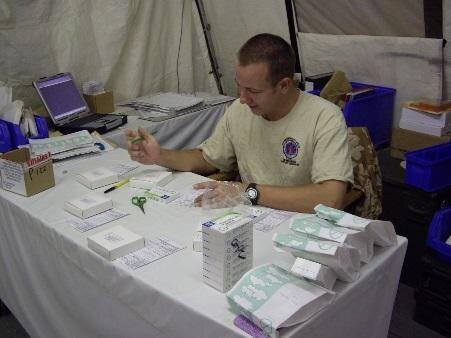Insight: Army Pharmacist Officer
A Different Career Choice – Army Pharmacist Officer
Lt Col Rob Liddington MRPharmS RAMC(V)
Ever since I was a small child, there was only one thing I wanted to do and that was join the Army. However, having some sensible advice at a crucial age, I decided to have a backup plan and studied pharmacy at the University of Portsmouth. After registering in 1996, I was working for Boots and decided to make the move and join the Army (although initially not as a pharmacist). It turned out that the Army was actively recruiting pharmacists as there were only five in the whole of the Regular Armed Forces, and so it couldn’t have been better – a career in the military using my hard-earned qualifications, and I have never looked back.
The Army Medical Services in one form or another has been around since 1660 and provides medical and veterinary support to the Armed Forces. Pharmacists and pharmacy technicians, although low in number, are a key asset, providing clinical guidance, and governance and assurance to the management of medicines across all aspects of Defence. Whilst pharmacy practice in the military is delivered to the same standards as civilian practice, the main difference is that Army pharmacists must be ready for deployment, sometimes to austere environments (e.g. South Sudan). Developing nations and disaster situations often present the western-trained medical professional with significant challenges. We often cannot rely on modern technology, regular resupply, temperature control, medicines information and may be working as the only pharmacist as part of a small multidisciplinary team.
To prepare for a career in expeditionary medicine or working in field environments (that would also include the NGOs) there is no specific undergraduate training on the kind of knowledge and skills needed by pharmacists. Therefore, Army pharmacists must have a strong clinical base across a lot of disciplines and a good understanding of logistics. They also have to keep themselves in good physical and mental shape to be able to cope on deployment. This is taught and developed as part of army training throughout your career, where a great deal of focus is placed on independent thinking, leadership, adaptability and resourcefulness. The army offers extensive training in all these areas but also supports professional development, for example, clinical diplomas, independent prescribing and higher education and there are great opportunities to take part (and excel) in sport and adventurous activities.
During my 18 years of Regular Service I was lucky to have served in some interesting places in England, Cyprus, Oman and deployed on operations in Bosnia, Kosovo, Iraq and Afghanistan. When not deployed, my roles have varied from supply chain management, training, and supporting delivery of primary and secondary care (primarily in emergency medicine, orthopaedics and critical care). The deployed role nowadays is focussed on supporting the full range of care in a field hospital. I was fortunate to be the MOD’s Chief Pharmacist for my last 3 years, which is a fascinating strategic position. This role is key to Defence as you set the medicines policy and represent the pharmacy agenda to the Surgeon General, the most senior medic in the MOD. I took advantage of all the extensive leadership training the army offers, and also completed a postgraduate diploma in Toxicology which proved really useful in supporting emergency medicine on operations.
There are of course challenges with being in the Army. Personally, the greatest challenges were often working away from home, away from family and friends, and working independently with few resources and little professional support. However, these challenges made the job much more interesting and built up my confidence and ability as a pharmacist. Time away also made me appreciate my time at home that much more.
I left the Regular Army in 2015 and joined the Army Reserve (what used to be called the TA) as a medical logistics specialist. The Reserve is a great option for me as I can have a second career as a civilian but also carry on with the military activities that I love, and deploy for short periods of time to support Defence. So far, I have been involved in exercises in Germany and healthcare development in Sierra Leone. As a civilian I also work for the MOD as their MHRA Responsible Person, maintaining our Wholesale Dealers Authorisation but also designing, managing and assuring the defence supply chain for medicines. Like me, there are opportunities for pharmacists to work in the MOD even if you don’t fancy the uniform. Most of the roles are in primary care but there are also opportunities in training and the supply chain. The links below will take you to the Army recruiting page and also an interesting article written by one of our civilian pharmacists working in Germany.
To be part of an organisation at the forefront of healthcare innovation and development remains a huge honour and is hugely rewarding, both professionally and personally. When I was deployed, it was so rewarding to make a visible difference to both our troops on the ground or to the local health service provision and this is why I want to continue my service in the MOD as an Army Reserve and as a civilian.
Information on Army careers can be found on these webpages:
https://apply.army.mod.uk/roles/army-medical-service/pharmacist-officer
https://www.chemistanddruggist.co.uk/feature/life-pharmacist-military
Anyone interested in joining the Army as a pharmacist can contact Lt Col Ellie Williams, Head of Pharmacy, at ellie.williams664@mod.gov.uk for more information.
This article was written by Lt Col Rob Liddington MRPharmS RAMC(V)



